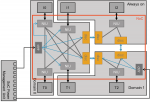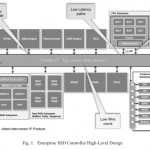There’s a lot of debate about how and when we are going to emerge from the worldwide economic downturn triggered by the pandemic. Everyone agrees we will emerge. This isn’t humanity’s first pandemic, nor will it be our last. But do we come out quickly or slowly? And what does the economy look like on the other side, particularly for … Read More
AI, Safety and Low Power, Compounding Complexity
The nexus of complexity in SoC design these days has to be in automotive ADAS devices. Arteris IP highlighted this in the Linley Processor Conference recently where they talked about an ADAS chip that Toshiba had built. This has multiple vision and AI accelerators, both DSP and DNN-based. It is clearly aiming for ISO 26262 ASIL D … Read More
That Last Level Cache is Pretty Important
Last-level cache seemed to me like one of those, yeah I get it, but sort of obscure technical corners that only uber-geek cache specialists would care about. Then I stumbled on an AnandTech review on the iPhone 11 Pro and Max and started to understand that this contributes to more than just engineering satisfaction.
Caching
A brief… Read More
Trends in AI and Safety for Cars
The potential for AI in cars, whether for driver assistance or full autonomy, has been trumpeted everywhere and continues to grow. Within the car we have vision, radar and ultrasonic sensors to detect obstacles in front, behind and to the side of the car. Outside the car, V2x promises to share real-time information between vehicles… Read More
Autonomous Driving Still Terra Incognita
I already posted on one automotive panel at this year’s Arm TechCon. A second I attended was a more open-ended discussion on where we’re really at in autonomous driving. Most of you probably agree we’ve passed the peak of the hype curve and are now into the long slog of trying to connect hope to reality. There are a lot of challenges, … Read More
Evolving Landscape of Self-Driving Safety Standards
I sat in a couple of panels at Arm TechCon this year, the first on how safety is evolving for platform-based architectures with a mix of safety-aware IP and the second on lessons learned in safety and particularly how the industry and standards are adapting to the larger challenges in self-driving, which obviously extend beyond … Read More
Safety and Platform-Based Design
I was at Arm TechCon as usual this year and one of the first panels I covered was close to the kickoff, hosted by Andrew Hopkins (Dir System Technology at Arm), Kurt Shuler (VP marketing at Arteris IP) and Jens Benndorf (Managing Dir and COO at Dream Chip Technologies). The topic was implementing ISO 26262-compliant AI SoCs with Arm… Read More
How Should I Cache Thee? Let Me Count the Ways
Caching intent largely hasn’t changed since we started using the concept – to reduce average latency in memory accesses and to reduce average power consumption in off-chip reads and writes. The architecture started out simple enough, a small memory close to a processor, holding most-recently accessed instructions and data … Read More
AI, Safety and the Network
If you follow my blogs you know that Arteris IP is very active in these areas, leveraging their central value in network-on-chip (NoC) architectures. Kurt Shuler has put together a front-to-back white-paper to walk you through the essentials of AI, particularly machine learning (ML) and its application for example in cars.
He… Read More
Safety Methods Meet Enterprise SSDs
The use of safety-centric logic design techniques for automotive applications is now widely appreciated, but did you know that similar methods are gaining traction in the design of enterprise-level SSD controllers? In the never-ending optimization of datacenters, a lot attention is being paid to smart storage, offloading… Read More











